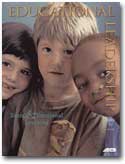Come Back to Earth
I want to thank Stan Karp for his rebuttal to Jeremy Rifkin ("Preparing Students for The End of Work' ") and Richard J. Murnane and Frank Levy ("A Civil Society Demands Education for Good Jobs") in the February 1997 Contemporary Issues section. I, too, think it so important to keep the direction of education focused on classroom teachers' experiences, not pie-in-the sky theorizing.
Karp recognizes the systemic problems—race, class, and piecemeal educational fads—that stump teachers and kids and fragment schooling. As the founder and director of the Vermont Equity Project for faculty development, I ask teachers to write anecdotes about their experiences with inequality to make them more aware of the systemic problems that can present barriers to our students' living up to their full potential.
—Merryn Rutledge, Communications Department, Champlain College, Burlington, Vermont
The View from the Trenches
Stan Karp ("Educating for a Civil Society: The Core Issue is Inequality," February 1997), speaks for many urban teachers who don't have a lot of power and get disillusioned, but want to stay in teaching for the long haul. He speaks with authority because he is doing what not too many people are willing to do for long—teach.
I teach and live in a Denver neighborhood where most families are Hispanic and 98 percent of the school children qualify for free lunches. We feed into a high school with a graduation rate of just under 50 percent. As a special education teacher, I was irritated last week when a child was referred back to my school after four other classroom placements in less than one year. From a program in an upper-middle class neighborhood for students with emotional disturbances (and where three adults were available for every 10 students), he was returned to his general education class here with none of the same supports.
This is only one of the many daily frustrations. Despite community and school interventions, many of our students do very poorly when they go on to middle school. I am beginning a doctoral program in urban education, but I fear I will get more ivory tower advice. My experiences—both as a teacher and an urban resident—have led me to Karp's conclusion: The core issue is indeed inequality.
—Becky Roberts, Fairmont Elementary School, Denver, Colorado
Basic Skills are a Start
In an effort to raise standards for all children, we have blurred the importance of a democratic education. Of course we want our children to know and vigorously apply the hard skills of basic math, problem solving, reading comprehension, and computers. But these are not the New Basic Skills, as Murnane and Levy (February 1997) contend. Our teachers never strayed from these skills. Stan Karp ("The Core Issue Is Inequality") is correct when he calls this the status quo.
As a school principal, I support our district's vision to align our curriculum and instruction to raise our test scores. The public demands it. We need to listen more to our communities and be held accountable.
As educational leaders, however, we must also teach what is appropriate for our students. When too much instructional time is spent testing for a narrow focus and students become passive recipients of mindless worksheets, we have missed our mark. When students are denied the arts and enriching opportunities, we have failed. A good education calls for balance. We must refocus our efforts to provide the rigor and authenticity that will leave each student with a passion for learning and for actively participating in a democratic society. In the words of Peter, Paul, and Mary, "When will we ever learn? When will we ever learn?"
—Joan Samuels Kaiser, Principal, Sedgwick Middle School, West Hartford, Connecticut
Italy's Creativity Study
It was both gratifying and edifying to learn of the large research project undertaken in Italy to determine the efficacy of creativity training ("Unlocking Creativity," Alessandro Antonietti, March 1997). I would like to point out, however, that in the uncontrolled school setting—which is the proper setting for such studies—so many factors affect cognitive and emotional growth that results will generally be inconclusive. Nevertheless, Antonietti's efforts are impressive and his experiences and remarks about how to encourage creativity are compelling.
—R. E. Myers, Healdsburg, California
